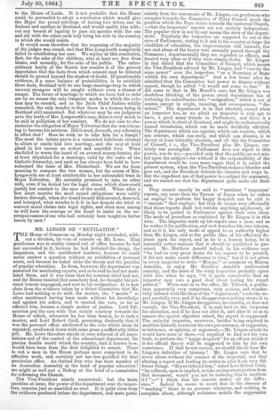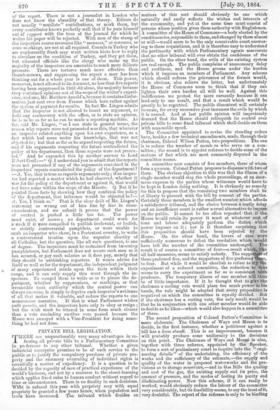MR. LINGEN ON " MUTILATION."
THE House of Commons on Monday night rescinded, with- out a division, its vote of censure on Mr. Lowe. That gentleman was in reality turned out of office because he had not succeeded in it, because he had irritated the clergy, the inspectors, and the certificated teachers, because he could never answer a question without an exhibition of personal scorn, and because he hated alike the theory and the practice of popular education. In form, however, the department was censured for mutilating reports, and as he said he had not muti- lated them, and it was clear that his nominal chief had not, and the House insisted that somebody had, he thought his per- sonal honour impugned, and sent in his resignation. It is now clear from the evidence taken by a Select Committee that Mr. Lowe had nothing to do with the matter, the " marks " so often mentioned having been made without his knowledge and against his orders, and to rescind the vote, so far as affected him, became a simple matter of justice. Lord Pal- merston put the case with that stately courtesy towards the House of which, whenever he has been beaten, he is such a master, and Lord Robert Cecil, premising distinctly that it was the personal effect attributed to the vote which alone he repented, swallowed down with some grace a sufficiently bitter pill. Mr. Lowe therefore stands at once relieved of all impu- tations and of the control of the educational department, the precise double result which the country, had it known how, would have been from the first delighted to secure. There is not a man in the House perhaps more competent to do effective work, and certainly not one less qualified for that particular office. An Oxford Don who has been member of an Australian Assembly at the head of popular education ! we might as well put a Bishop at the head of a commission for reforming the Church.
The Vice-President stands exonerated; but the Main question at issue, the power of the department over its inspec- tors, remains jest as unsettled as ever. It is quite clear from the evidence produced before the department, and more parti- cularly from the statements of Mr. Lingen,—a gentleman who occupies towards the Committee of Privy Council much the position which the Pope claims towards the universal Church, —that the inspectors' reports are not entirely independent. The popular view is not by any means the view of the depart- ment. Popularly the inspectors are supposed to act as the eyes of Parliament, stating to it and to the country at large the condition of education, the improvements still unmade, the use and abuse of the heavy vote annually passed through the Commons ; departmentally they are regarded as officers, and treated very often as if they were simply clerks. Mr. Lingen in fact stated that the Committee of Council, which means the Vice-President advised by Mr. Lingen, had " exactly the same power" over the inspectors " as a Secretary of State within his own department." And a few hours after he admitted that the Committee had power to dismiss without appeal, though he added " it would not come to that." It did come to that in Mr. Morell's case, but Mr. Lingen was doubtless thinking of the power every department has of torturing its subordinates into "resignation," which is not of course, except in origin, meaning, and consequences, " dis- missal." The department is in fact absolute, except when an inspector has, as we admit an inspector is very apt to have, a good many friends in Parliament, and there is a power which is short of dismissal, and might be ecclesiastically named translation, which can be made decidedly effective. The department which can appoint, which can remove, which can censure, which can snub, and which can dismiss, is in theory at least tolerably absolute, and all this the Committee of Council, i. e., the Vice-President plus Mr. Lingen, cer- tainly can accomplish. Parliament does not object to this power, nor do we,—provided only that the public are not mis- led upon the subject—for without it the responsibility of the department would be even more vague than it is under the present system, when the Vice-President makes a blunder and goes out, and the President defends the blunder and stays in. But the expedient use of that power is a subject for argument, and we cannot see that the department quite make out their case.
They cannot exactly be said to " mutilate " inspectors' reports, any more than the Tycoon of Japan when he orders an employe to perform the happy despatch can bo said to " execute " that employer; but they do secure very effectually that those reports shall not contain anything unpleasant, or likely to be quoted in Parliament against their own ideas. The mode of procedure as explained by Mr. Lingen is in this wise. The inspector sends up his report once a year, and as he writes it for publication, and as it describes his own labours, and as it is his only mode of appeal to an authority higher than Mr. Lingen, and as the public idea of his efficiency de- pends upon the report, and as he is a human being, he is naturally rather anxious that it should be published as pro- mised. Mr. Matthew Arnold indeed, in his evidence says- "he had no very great desire for his reports to be printed, it did not make much difference to him," but it is not given to every inspector to write "Merope," or comment on Marcus Aurelius, or enjoy Mr. Matthew Arnold's undisturbed serenity, and the mass of the sixty inspectors probably agree with him when he says, "it is quite conceivable that an inspector may care a good deal about having his report printed." When sent in to the office, Mr. Tilleard, a gentle- man apparently very competent, very zealous, and wonder- fully imbued with the ideas of the " department," reads the re- port carefully over, and if he disapproves anything shows it to Mr. Lingen. If Mr. Lingen disapproves, he consults, or does not consult, the Vice-President, it is sent back to the inspector for alteration, and if he does not alter it, and alter it so as to remove the special objection raised, the report is suppressed. The unlucky inspector, moreover, besides being required to mutilate himself, to cut out his own pet sentence, or suggestion, orinference, or opinion, or argument,—Mr. Lingen admits he would have none of those,—is required to find out his own fault, to perform the " happy despatch" for an offence which it is the official theory will be suggested to him by his own conscience. If that be not control, we should like to hear Mr. Lingen's definition of tyranny ! Mr. Lingen says that he never alters without the consent of the inspector, and that altering a report and leading its writer to alter it are very dif- ferent things. "If you induced him," asked Lord Robert Cecil, " by a threat, open or implied, to take an important portion from that document, would you not be inducing him to mutilate it ? "—" I think that his consent makes all the differ- ence." Indeed he seems to assert that in the absence of " marking" there is no pressure whatever, and nothing to complain about, although resistance entails the suppression
of the report. There is not a journalist in London who does not know the absurdity of that theory. Editors do not usually "mutilate" contributions, or mark them, but every contributor knows perfectly well that if he puts himself out of rapport with the tone of the journal for which he writes his paper will be rejected. With men of the stamp of the inspectors coarse measures like " menaces," or censures, or even markings, are not at all required. Consuls in Turkey who are unpleasantly frank may want written hints how to reply to circulars on the condition of Turkey, and they get them, but educated officials like the clergy who make up the majority of the inspectors are amenable to much more delicate pressure. There are tortures much more effective than thumb-screws, and suppressing the report a man has been thinking out for a whole year is one of them. This power, moreover, is not allowed to lie dormant, no less than five reports having been suppressed in 1861-62 alone, the majority because they contained opinions out of the scope of the writer's experi- ence, and one, Mr. Matthew Arnold's, because it containedinfor- mation just sent over from France which bore rather against the system of payment for results. In fact Mr. Lingen admits that the inspector is not allowed to insert an argument, to hold any controversy with the office, or to state an opinion, he is to be as far as he can be made a reporting machine. As far, said Mr. Lingen, " as I can state in general terms, the 'reason why reports were not presented was this, that wherever an inspector related anything upon his own experience, as a fact which had come under his knowledge, that was not objected to ; but that so far as he argued respecting the future, and if his arguments respecting the future contradicted the policy of his department, then those reports were not presen- ted." And he expanded this by another -answer to Lord Robert Cecil :—" Q. I understand you to admit that the reports were not presented if any of the arguments contained in the inspectors' reports contradicted the policy of the department ?
—A. Yes, that is true as regards arguments only; if an inspec- tor had reported a matter which he had observed, whether it
was for the policy of the department or against it, that would not have come within the scope of the Minute. Q. But if he pointed those facts by showing how they confuted the policy of the department, that inference would be objected to ?— A. Yes, I think so." That is the clear drift of Mr. Lingen's statement as wrung out of him line by line in cross- examination, and we submit it proves that the power of control is pushed a little too far. The power
must exist, of course ; no department could work for a week if it were compelled to publish irrelevant, or foolish,
or strictly controversial pamphlets, or were unable to snub au inspector who chose, in a Protestant country, to write a controversial treatise upon the superior chastity of all Catholics, but the question, like all such questions, is one of degree. The inspectors must be restrained from becoming pamphleteers, but Parliament does not secure such men as it has secured, or pay such salaries as it does pay, merely that they should ho unthinking reporters. It wants advice for itself as well as for the department, the independent judgment of many experienced minds upon the facts within their range, and it can only supply this want through the in- spectors. To compel them to write so as to please the de- partment, whether by suppressions, or markings, or that irresistible tacit authority which the central power can always exercise, is simply to deprive each inspector's evidence of all that makes it valuable, and reduce the reports to one monotonous narrative. If that is what Parliament wishes cadit qumstio, and the inspectors have only to obey or resign ; but the wish must be uttered in some form much clearer than a vote rescinding another vote passed because the House was annoyed with a Vice-President for doing some- thing he had not done.































 Previous page
Previous page